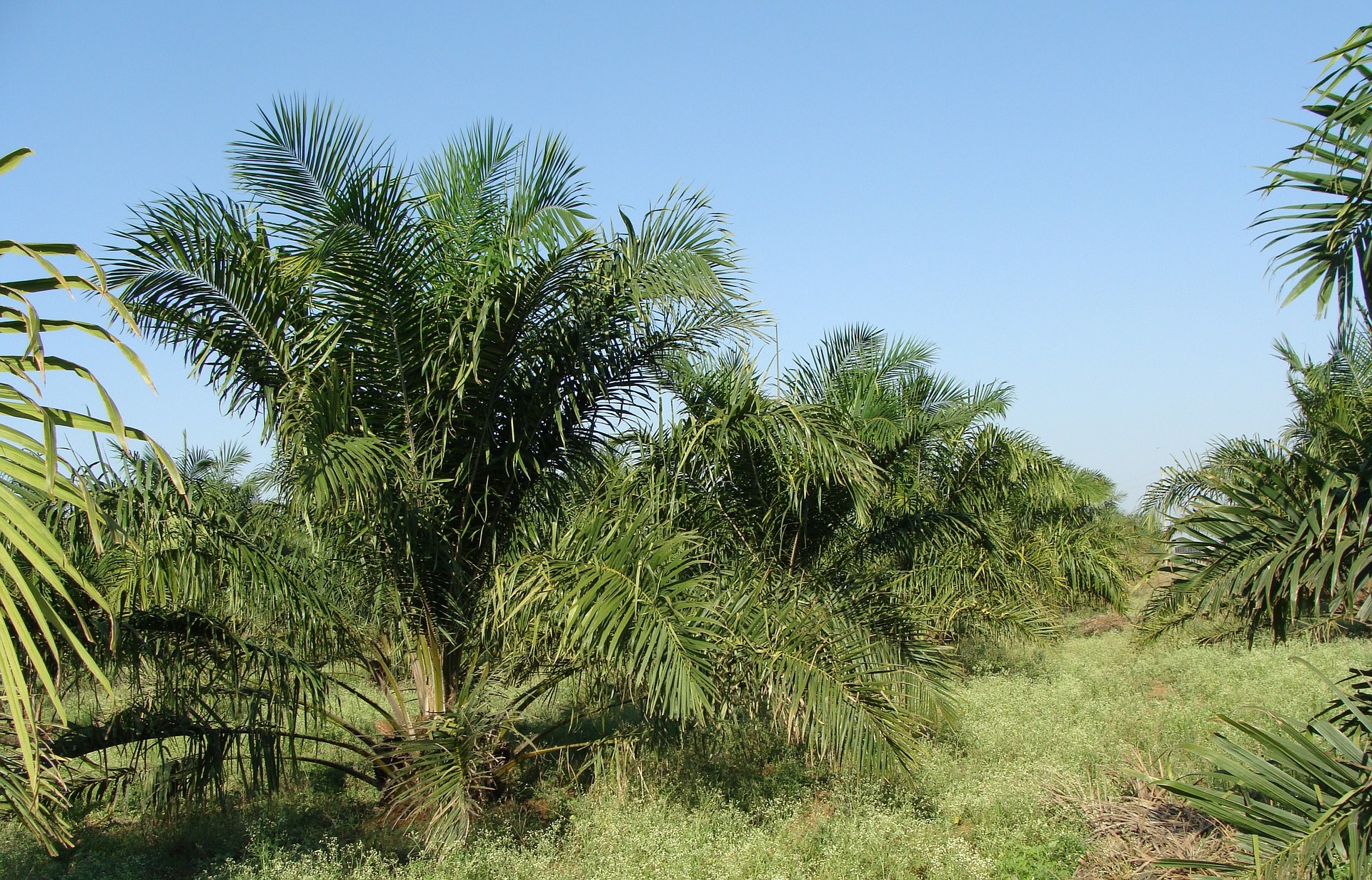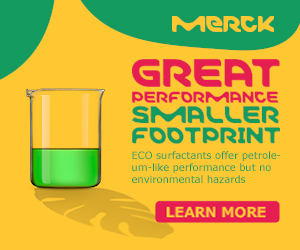Cosmetics & Personal Care
Getting to grips with palm oil 22nd March 2018
By our Editorial Team
We look at the various uses of palm oil today, the controversies surrounding it, and efforts being made across the industry

We look at the various uses of palm oil today, the controversies surrounding it, and efforts being made across the industry to encourage sustainable cultivation of this increasingly important product.
What is it?
Palm oil, like all fats, is composed of fatty acids. It has an especially high concentration of saturated fat (specifically, palmitic acid: 43.5% content), along with monounsaturated oleic acid (36.6% content). It is naturally reddish in colour because of a high beta-carotene content. However, crude palm oil that has been ‘refined, bleached and deodorized’ (RBD) does not contain carotenoids.
Palm oil, like all fats, is composed of fatty acids. It has an especially high concentration of saturated fat (specifically, palmitic acid: 43.5% content), along with monounsaturated oleic acid (36.6% content). It is naturally reddish in colour because of a high beta-carotene content. However, crude palm oil that has been ‘refined, bleached and deodorized’ (RBD) does not contain carotenoids.
The RBD process first involves fractionation – crystallization and separation to obtain solid (stearin), and liquid (olein) fractions – before impurities are removed through melting and degumming. The oil is then filtered and bleached to remove odours and colours. The resulting oil and free fatty acids are used in the manufacture of soaps, washing powder and other everyday products. Further fractionation results in cooking oil, or allows it to be processed into even more products.
For example, palm oil is also used to produce both methyl ester and hydrodeoxygenated biodiesel (often blended with other fuels to create palm oil biodiesel blends). Palm oil methyl ester is created through transesterification; hydrodeoxygenated biodiesel is produced by direct hydrogenolysis of the fat into alkanes and propane. The organic waste matter from processing oil palm, including palm shells and fruit bunches, can also be converted into pellets that can be used as a biofuel.
The versatility of palm oil and its apparent near omnipresence in modern life mean that this industry is now big business. According to a 2016 report by Zion Market Research, the global palm oil market was valued at $65.73 billion in 2015, and is expected to reach $92.84 billion in 2021. Separately, the FAO forecasts that global demand for palm oil will double between 2012 and 2020, and triple by 2050.
What’s the problem?
The broadening use of palm oil, and the income it attracts, has encouraged wider cultivation. Increasing demand for palm-based products and the expansion of palm plantations, especially in Indonesia and Malaysia, have destroyed forests, peatland and biodiversity. The situation has attracted the concerns of environmental activist groups. A high-profile issue has been the eradication of the habitat of the world’s last remaining orangutans.
The broadening use of palm oil, and the income it attracts, has encouraged wider cultivation. Increasing demand for palm-based products and the expansion of palm plantations, especially in Indonesia and Malaysia, have destroyed forests, peatland and biodiversity. The situation has attracted the concerns of environmental activist groups. A high-profile issue has been the eradication of the habitat of the world’s last remaining orangutans.
Other concerns relate to poor working conditions, and social conflict with indigenous populations and residents of palm oil producing communities. Furthermore, the use of palm oil for biodiesel has led to concerns that the need for fuel is being placed ahead of the need for food, leading to malnutrition in developing nations.
RSPO and FONAP
In 2004, an industry group called the Roundtable on Sustainable Palm Oil (RSPO) was formed to work with the palm oil industry to address these concerns. Members of RSPO include palm oil producers, environmental groups, and manufacturers who use palm oil in their products. The organization has established international standards for sustainable palm oil production, and products containing certified sustainable oil can carry the RSPO trademark.
In 2004, an industry group called the Roundtable on Sustainable Palm Oil (RSPO) was formed to work with the palm oil industry to address these concerns. Members of RSPO include palm oil producers, environmental groups, and manufacturers who use palm oil in their products. The organization has established international standards for sustainable palm oil production, and products containing certified sustainable oil can carry the RSPO trademark.
Chemicals giant BASF was one of the first RSPO members. In a recent press statement, Xavier Susterac, Senior Vice President BASF Personal Care Europe, explained “We engage intensively with our stakeholders at all levels of the supply chain to understand their needs and help them achieve their targets. Our customers rely on our expertise to fulfil the additional requirements necessary to meet their commitments. Beyond this, we support smallholders as an important link within the value chain.”
Another industry group is the Forum for Sustainable Palm Oil (FONAP), established in 2013 and officially registered in 2015 as an alliance of companies, non-governmental organizations, associations and the German Federal Ministry of Food and Agriculture (BMEL). The association has 46 members, including small, medium-sized and multinational companies from various palm oil processing sectors. The aim of FONAP is to significantly increase the proportion of certified palm oil, palm kernel oil and their derivatives and fractions in the German, Austrian and Swiss markets. Regular members commit themselves to use only 100% certified palm oil and to improve current certification systems.
BASF joined FONAP as a producer of oleoderivatives in the category ‘Supporter’ in November 2017. As a leading global processor of oleochemicals, one of BASF’s key raw materials is palm kernel oil and its primary derivatives. Both are mainly used for the production of ingredients for the cosmetics, detergents and cleaning industries, as well as in human nutrition.
“Becoming an official supporter of FONAP is an important signal for BASF in its ongoing efforts to foster sustainable oil palm products. This underlines our commitment to transform the market towards sustainable renewable resources and to help our customers fulfill their FONAP commitments,” Susterac is reported to have commented at the time.
Industry efforts
Unfortunately, demand for certified sustainable palm oil has not been consistently high across the world. Low market demand has been attributed to the higher cost of certified sustainable oil, leading palm oil buyers to purchase cheaper non-certified palm oil. It is hoped that through growing awareness of the surrounding issues, consumer demand and corporate social responsibility may drive more manufacturers to limit their products to certified sustainable palm oil.
Unfortunately, demand for certified sustainable palm oil has not been consistently high across the world. Low market demand has been attributed to the higher cost of certified sustainable oil, leading palm oil buyers to purchase cheaper non-certified palm oil. It is hoped that through growing awareness of the surrounding issues, consumer demand and corporate social responsibility may drive more manufacturers to limit their products to certified sustainable palm oil.
Efforts from industry to raise awareness and comply with socially responsible practices in relation to certified sustainable palm oil are frequently in the news. Of note, in February 2018, Unilever took the radical step of providing complete transparency on its palm oil supply chain, with the intention of making a real step change towards greater transparency in the industry.
“We strongly believe that being open and transparent is key to achieving a fully traceable supply chain,” says a company statement on the issue. “[This is] a goal we set ourselves back in 2013 when we first launched our Sustainable Palm Oil Sourcing Policy and which we have been pursuing ever since.”
According to Unilever, not only does this transparency give the company better visibility of where its palm oil comes from, it also enables them to more proactively identify issues, and address them quickly and effectively. And, as a result of this data being available, it is much easier for others to bring demonstrable challenges and insights to Unilever’s attention, enabling them investigate and work to remedy the issues alongside suppliers, NGO partners, governments and other stakeholders.
Also in February this year, Inolex make the positive step of declaring that it will now offer RSPO certified mass-balanced palm across its full product line. An active member of the Roundtable on Sustainably Sourced Palm Oil (RSPO) since 2012, Inolex obtained certification by the RSPO in 2017 to supply mass-balanced palm to customers. The company has been working toward this comprehensive offering as part of its ongoing sustainability initiatives for improved supply chain traceability and transparency. A commitment to zero deforestation by 2020 has also been made.
“We know that our partners and the end-consumer want ingredients with responsibly sourced raw materials. We are proud to do our part to help promote mainstream trade and traceability of sustainable palm,” said Art Knox, vice president, Global Head of Sales at Inolex.
In 2015, Clariant teamed up with Wilmar International, their joint venture The Global Amines Company, Wild Asia (a local social enterprise) and L’Oréal to educate Malaysian palm oil small producers on sustainability, certification and supply chain traceability – and increase productivity by 20% by 2020. The project aims to ensure economic development of small-scale producers by giving them access to global markets, introducing better cultivation practices and creating environmental benefits by engaging small producers in sustainable palm trees cultivation through RSPO certification. At the same time, Clariant has certified all relevant locations that process products made from palm oil according to RSPO criteria.
Can we move away from palm oil?
There are, in some countries, strong preferences towards palm oil free products. These preferences are mostly related to sustainability and/or to health issues (e.g. a desire to reduce levels of saturated fatty acids). For many applications, it would possible to replace palm oil by liquid oils, blends with exotic fats, or blends with fully hydrogenated liquid oils. These replacements could cause some technological challenges, although these would not be insurmountable if the determination to succeed were there.
Researchers in the UK are currently working to produce a yeast-based alternative to palm oil. Teams from the University of Bath and University of York are developing the palm-oil substitute from a yeast grown using sustainably sourced waste feedstocks. The yeast Metschnikowia pulcherrima can be grown on a variety of agricultural and food wastes. With slight changes to growth conditions, the yeast can be made to produce a thick oil with nearly identical qualities to palm oil. The team, along with industry partners Croda, C-Tech and AB Agri, were awarded a grant of £4.4m to examine how to produce the oil on an industrial scale. The 4-year project could have a significant, positive impact in sustainable energy, food and personal-care technologies in the future.

Many companies already offer palm oil free products, often in response to growing consumer awareness and demand. For example, in addition to its full offering of mass-balanced ingredients, Inolex continues to offer a range of palm-free products as an alternative for beauty care brands that wish to further address the sustainability of their palm use. These products include palm-free sensory fluids, sensory emulsifiers, alternative preservation systems, polymers and hair conditioning agents – categories which have historically been palm-derived.
Recognising consumer demand, many other companies are following suit.
Indeed. Can we afford not to?



